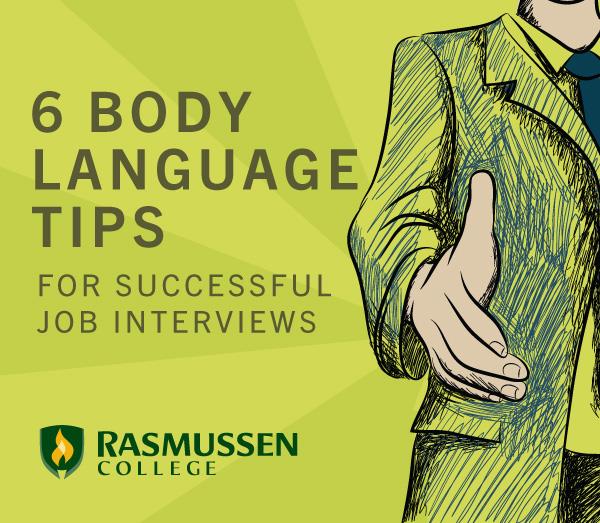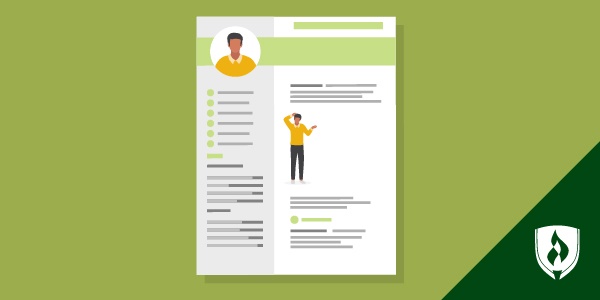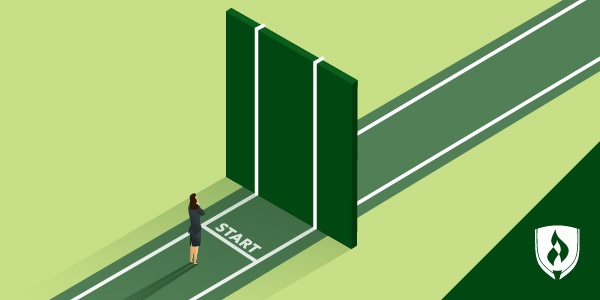Getting your degree is a huge accomplishment. It takes effort, drive and a whole lot of dedication. You know it’s a step in the right direction for your future and your family. However, finishing up in the classroom doesn’t mean the hard work is over—your job search is just beginning. Finding and applying for jobs can be time consuming and frustrating, but the real intimidation can come from the interview itself.

Getting back in the job search can be intimidating, but when armed with the knowledge of how you can carry yourself to make the best impression possible, you’ll empower yourself to walk in with professionalism and confidence.
Before we get into the subject matter, here’s a tip on how to avoid sabotaging your own job search.
A bit about body language
Once you’ve landed that coveted interview, be sure to prepare in advance. Many applicants research the company and run through practice scenarios prior to the big day. Despite your efforts to make a good impression, you may be sabotaging your own job search with something seemingly harmless: body language.
Body language speaks volumes about your attitude and mindset. Despite any accomplishments or strengths you’ve shared, your interviewer will most likely remember you by your body language, whether they realize it or not.
“A big way for the interviewer to feel like the candidate is a fit is to like them and to feel comfortable with them. In order to accomplish that sense, the candidate needs to demonstrate that in their body language,” career coach Dorothy Tannahill-Moran says.
We caught up with a handful of hiring managers and body language experts to get insights into how your posture, gestures and appearance influence your image and impression in a job interview.
1. The perfect handshake
A handshake is a seemingly minor detail of an interview, but it carries its weight in influence. A handshake often occurs within the first few moments of the interview and lays the groundwork for your first impression. The perfect handshake should be strong, hold a complete grasp of the hand, and should be accompanied by eye contact and a smile.
Be conscious of yourself during this interaction—never wipe your hand off on your pants, which you may do without thinking. It conveys that you find the person unclean. Avoid placing your other hand on top of the hand shake—the additional grasp can come across as overbearing, according to Psychology Today.
2. Exude confidence
Don’t let nerves get the best of you on the big day. To combat any potential interview jitters, prepare as much as possible ahead of time. Knowing that you’ve done all you can before the fact will give you an extra boost of confidence that employers love to see. In fact, according to Forbes, confidence is one of the top qualities employers look for in applicants.
To exude this confidence in your body language, keep your positioning open. Walk into the interview room with shoulders back and your head held high. While standing, strike a power pose. The Wall Street Journal suggests you stand tall with your feet planted at least hip width apart. This pose will not only make you look more confident, but it will also reduce your own feelings of stress and uncertainty through a physiological boost in testosterone.
Once seated avoid crossing your arms—a move considered “defensive” and “closed-off”—and instead lean forward with your hands folded on the desk. Smile and maintain steady eye contact with the interviewer to demonstrate your confidence.
3. A calm composure
A calm and relaxed demeanor goes hand-in hand with confidence. If you’re feeling nervous, your built-up energy may emerge in the interview through leg shaking, finger tapping or even accelerated speech. Fidgeting in the interview may be an unconscious effort on your part, but it certainly won’t go unnoticed by the interviewer. In fact, it is likely to divert the interviewer’s attention away from what you’re saying.
“Sometimes interviewees get carried away by all the thoughts in their head—really wanting the job, wanting to interview well, et cetera—that they don’t realize that they are creating a confusing impression through body language and energy,” career coach Jen Suarez says.
Fidgeting also conveys your anxieties rather than your confidence. Take deep breaths throughout the interview. Sit up straight to breathe fully through the stomach. Deep breathing will calm you down by lowering your heart rate and clarifying the mind, according to Harvard Medical School.
4. Be positive from the inside out
Another body language tip is to think positively. Try walking into the interview with a smile. A smile will go a long way in an interview setting, but if it is too forced, it will actually have a detrimental effect on the interviewer—think, Joker from the Batman movies!
To create a genuine smile and reinforce a pleasant appearance, think positive thoughts. “By thinking positive thoughts, you’ll increase your positive body language,” says Ronald Kaufman, executive coach and author of Anatomy of Success.
A smile will build trust between the interviewer and yourself. It makes you appear interested and approachable. It also demonstrates your ease and confidence during the interaction. If you’re nervous, a smile will calm you down as well.
To establish a positive body language, Kaufman also suggests sitting upright and leaning forward, keeping arms open, gesturing naturally, maintaining eye contact, keeping your face relaxed and breathing fully.
5. Engage & connect
An interview is a chance to make a connection that you can’t simply do through a resume, says Tannahill-Moran. You want to make a strong connection and be memorable to the interviewer. According to Erik Bowitz, resume consultant, you can better engage with the interviewer with your body language.
Bowitz suggests having a fluid posture rather than be overly rigid. Use hand gestures as they come naturally. More importantly, be present in the moment. For this body language tip, listen to what the interviewer says and show that you’re listening by nodding. When asked a question, feel free to pause for a moment to think rather than jump into a seemingly automatic response.
6. Professionalism
While it’s good to be personal in your interview, don’t let your professionalism falter as a result. One of the easiest ways to follow this body language tip is to dress the part. Look “put together,” but be sure you’re comfortable in whatever you’re wearing. If you chose to wear a skirt, ensure that it is long enough, especially when sitting or crossing your legs.
If you brought papers to the interview, have them organized and ready to be laid on the table so you don’t have to shuffle through your briefcase or handbag and risk coming across as unorganized.
No matter how the interview went, finish it with another strong handshake. Thank the interviewer for their time and find your power stance once more before your departure.
Now you know ...
The pressure to find a job will likely build once you near graduation, especially if your family is depending on you. The job search is tough, and interviews can be intimidating for recent graduates. Make the most of your job search and practice these body language tips from the experts to turn those interviews into job offers!
Which one of these body language tips do you think is most helpful for your job interviews? Are there any we missed? Tell us in the comments below.




